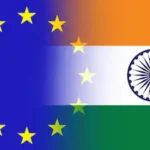
Senior negotiators from India and the European Union began the 14th round of Free Trade Agreement (FTA) discussions today in Brussels, marking a renewed effort to conclude a long-pending pact that could significantly boost trade and investment flows between the two regions. The talks aim to finalize a deal by year-end, addressing key issues such as tariffs, market access, digital trade, intellectual property, and environmental standards.
The India–EU trade relationship currently accounts for roughly USD 130 billion in annual trade, covering goods and services, including machinery, pharmaceuticals, IT services, and chemicals. Officials from both sides noted that the FTA would strengthen economic cooperation and provide a more predictable and transparent framework for businesses, investors, and consumers.
A major focus of the ongoing negotiations is the services sector, where India holds a competitive advantage in IT, professional services, and financial consultancy. European negotiators are particularly interested in ensuring standards for labor, digital compliance, and regulatory alignment, while Indian delegates are seeking greater access for exports of software, engineering, and technical services.
Trade in goods is also a critical area of discussion. India is seeking reduced tariffs on agricultural products, machinery, and components to enhance competitiveness, while the EU is pressing for better market access for automobiles, pharmaceuticals, and luxury goods. Both sides have emphasized the need to harmonize regulations and facilitate smoother customs procedures.
Sustainability and environmental commitments have become increasingly important in this round. Discussions include carbon footprint regulations, renewable energy trade, and circular economy initiatives, reflecting India and the EU’s commitment to the Paris Agreement goals and green trade practices. Analysts say that including environmental standards in the FTA could encourage investment in clean technology, energy-efficient manufacturing, and sustainable infrastructure projects.
Economic experts point out that the agreement could have wide-reaching implications for both regions. For India, the FTA could open access to a high-value European market, increase exports, attract foreign investment, and create jobs in manufacturing and services. For the EU, greater access to India’s rapidly growing economy, consumer market, and skilled workforce offers new opportunities for investment and collaboration.
Political will remains strong on both sides. Indian officials are leveraging the FTA to strengthen economic diplomacy, while the EU views India as a strategic partner in Asia, crucial for supply chain diversification and global trade stability. Negotiators have indicated that any deal will need to balance economic growth objectives with regulatory and environmental safeguards.
Analysts believe that once concluded, the India–EU FTA could serve as a benchmark for future trade agreements, promoting high-standard trade rules and boosting confidence in cross-border business. Companies on both sides are already preparing to align operations and compliance frameworks in anticipation of the agreement.
In conclusion, the restart of India–EU FTA talks signals a renewed commitment to deepening economic ties. With successful negotiations, the deal is expected to facilitate trade, attract investment, and strengthen the strategic partnership between India and the European Union, positioning both regions for sustained growth and global competitiveness in the coming years.
